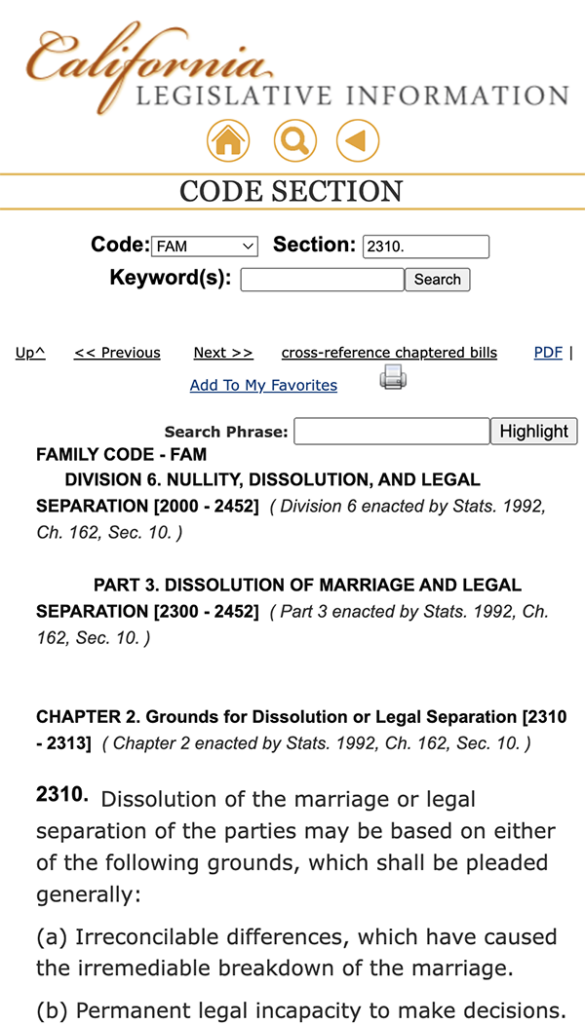When navigating a divorce in California, understanding the legal grounds for divorce is essential. The grounds on which you base your divorce can impact decisions regarding asset division, spousal support, and even custody of children. In California, spouses have the option to pursue a no-fault divorce, which is more commonly used, or can pursue certain claims that may influence the outcome of the proceedings. Here, we’ll explore both no-fault grounds and specific conditions that may influence a divorce outcome in the state.
Understanding California’s No-Fault Divorce
In California, the no-fault divorce standard means that one spouse does not need to prove the other’s wrongdoing to file for divorce. Instead, one spouse only needs to cite irreconcilable differences or incurable insanity as grounds for divorce. Since the 1970s, California has taken this approach, focusing on simplifying divorce proceedings and minimizing blame.

1. Irreconcilable Differences
“Irreconcilable differences” is the most common ground for divorce in California. It means that the marriage has broken down beyond repair due to incompatibility, and there is no hope of reconciliation. California Family Code §2310 outlines irreconcilable differences as grounds for dissolution, making it easier for couples to divorce without proving fault.
This approach respects both spouses’ rights and privacy by avoiding blame or detailed personal arguments in court. A couple simply needs to agree—or one spouse needs to declare—that the marriage cannot continue. No additional evidence is required to demonstrate these differences, and the divorce can proceed without detailed testimony or proof of incompatibility.
2. Incurable Insanity
The second, less common, no-fault ground for divorce in California is incurable insanity, also detailed under California Family Code §2310. If a spouse files for divorce based on this ground, they must provide clear evidence, often through medical or psychiatric records, that their spouse is permanently incapacitated due to mental illness.
This ground is rarely used and can be complex to prove in court. A mental health professional may need to provide testimony, and California courts may appoint a representative to advocate for the interests of the incapacitated spouse during proceedings.

Meet Family Law Lawyer
Catherine J. Navarro
Partner
Fault-Based Conditions Influencing Divorce Outcomes in California
Although California does not require a spouse to establish fault for divorce, certain fault-based factors can impact the court’s decisions, particularly in property division and spousal support. Here are some fault-related considerations that can influence a California divorce case:
1. Adultery and Its Financial Implications
While California courts do not consider adultery grounds for divorce, evidence of a spouse’s extramarital relationship could influence financial decisions in a limited way. For example, if a spouse uses marital funds for gifts, vacations, or other expenses related to a paramour, the wronged spouse may be entitled to reimbursement. California Family Code §721 specifies fiduciary duties within marriage, requiring each spouse to act in the best financial interest of the other. Misusing marital assets could constitute a breach of this duty.
2. Domestic Violence and Spousal Support
In cases involving domestic violence, California courts may consider this when deciding on spousal support. The California Family Code §4320(i) specifically allows the court to evaluate a history of domestic abuse when determining alimony. A spouse who has suffered abuse can request a restraining order, which may influence custody, property, and support decisions. Additionally, a history of abuse may lead to limitations on the abusive spouse’s custodial rights to protect the well-being of children involved.
3. Substance Abuse and Child Custody
While substance abuse is not grounds for divorce itself, it can play a significant role in child custody decisions. Courts prioritize the best interest of the child, as laid out in California Family Code §3011. If one spouse can demonstrate that the other’s substance abuse poses a risk to the child’s safety, it may affect custody and visitation arrangements. Evidence of substance abuse may include records of prior convictions, DUIs, or even witness testimony. The court may order supervised visitation or limit custody rights to ensure the child’s safety.
4. Abandonment (Spousal Desertion)
Although not a standalone ground for divorce in California, abandonment (or desertion) can influence spousal support and property division. Abandonment refers to one spouse leaving without intent to return and without communicating with the family. If a spouse’s abandonment has caused financial or emotional harm to the family, the court may factor this into its decisions, potentially awarding the abandoned spouse more favorable support arrangements.
How Grounds for Divorce Impact Property Division and Spousal Support
California’s divorce law follows a community property model, meaning that all assets and debts acquired during the marriage are typically divided equally between spouses. However, in some situations, the court may take fault-based issues into account when deciding on spousal support and property division.
For instance:
- Adultery and Financial Impact: If a spouse’s infidelity involved spending community assets, the court may reimburse the innocent spouse as part of the property division process.
- Domestic Violence: Victims of domestic violence may receive additional spousal support, and the abusive spouse may receive reduced visitation rights in cases involving children.
Frequently Asked Questions About Grounds for Divorce in California
Q: Do I need to prove fault to get a divorce in California?
A: No, California is a no-fault state, which means you only need to cite irreconcilable differences or, in rare cases, incurable insanity. No proof or blame is necessary to file for divorce.
Q: Can infidelity affect the outcome of my divorce?
A: While adultery is not grounds for divorce, misuse of marital funds on an affair may influence financial decisions, including property division and spousal support.
Q: Will domestic violence affect spousal support?
A: Yes. California courts consider domestic violence when deciding on alimony. Victims may receive higher support or restricted custody for the abusive spouse.
Q: What if my spouse has a substance abuse issue?
A: Substance abuse can impact child custody decisions, with courts prioritizing the child’s safety and best interests. This may lead to limited or supervised visitation rights for the parent struggling with substance issues.
Seeking Professional Legal Support in California
If you’re considering filing for divorce in California, consulting with a knowledgeable family law attorney is essential. An attorney can help clarify the legal grounds, support your case, and protect your rights. Whether your case is straightforward or involves complex fault-related issues, a lawyer can provide guidance through every step of the divorce process.
For more information on California divorce laws, consult the California Family Code, or visit the California Courts Self-Help Guide for resources on navigating divorce proceedings.
Final Thoughts
Understanding the grounds for divorce and related conditions can make a significant difference in the outcome of your case. At Fontes Law Group, we are here to guide you through each step of the divorce process with compassion and clarity, ensuring that your rights and interests are fully protected. With offices in Santa Ana and Riverside, our bilingual team is dedicated to helping you navigate California’s no-fault divorce system while addressing any specific circumstances that may arise in your case. Contact us today to learn how we can support you during this challenging time, providing personalized legal assistance tailored to your unique needs.
